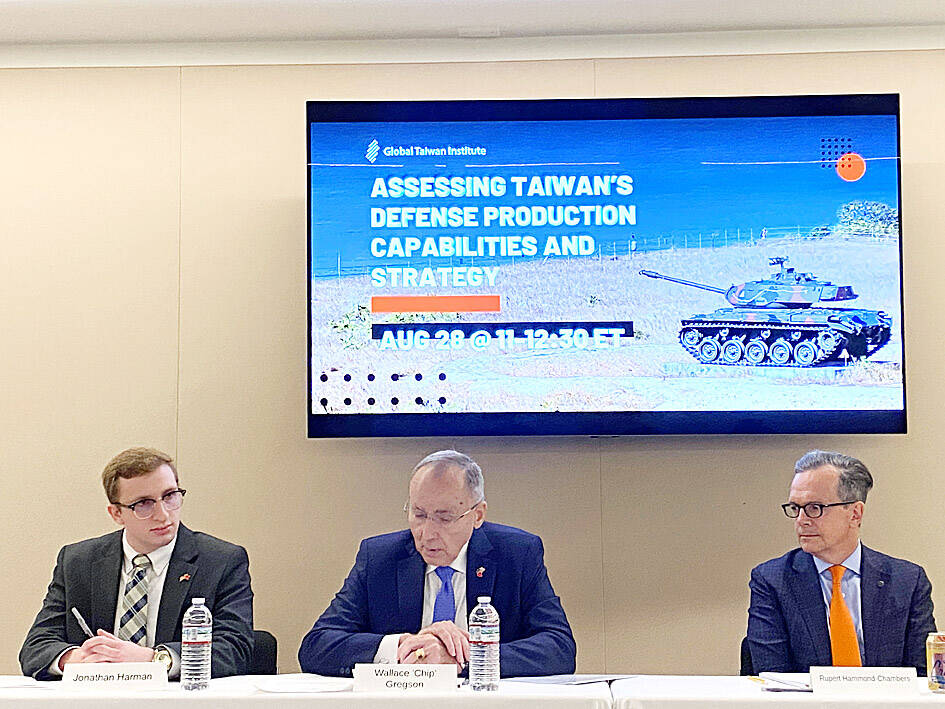Washington remains “committed” to Taiwan’s security, but it has not done enough to support the “modernization” of Taiwan’s military in the face of evolving threats posed by China, the US-Taiwan Business Council said on Tuesday.
“The [US President Joe] Biden administration appears to remain committed to a steady cadence of Taiwan security assistance,” council president Rupert Hammond-Chambers was quoted as saying in a statement.
Speaking in response to an announcement on Tuesday by the US Department of Defense that the US Department of State had approved the sale of military goods and services to Taiwan worth about US$228 million, Rupert Hammond-Chambers said it continues a “consistent trend” over the past four years of the Biden administration providing military equipment in “relatively small-value tranches.”

Photo: CNA
The US Defense Security Cooperation Agency said in a separate statement that the state department “made a determination approving a possible foreign military sale” to the Taipei Economic and Cultural Representative Office in the US for “return, repair and reshipment of spare parts and related equipment.”
In Taipei, the Ministry of National Defense said that the sale — the 16th foreign military sale from the US since 2020 — would be useful to “maintain the combat readiness and safety of air force equipment.”
However, despite the sale, Hammond-Chambers said that Washington’s support for Taiwan’s “force modernization” has been “on hold since 2020.”
The US has a “singular focus” on “bolstering Taiwan’s defense against a kinetic D-Day-style attack,” but such an assault “is not the only challenge that the Taiwan military faces,” he said, referring to the World War II Normandy landings by Allied forces.
“The absence of US support for other areas — including gray zone, blockade and quarantine scenarios — is destabilizing over time,” he said. “Meanwhile, China’s force modernization continues apace.”
The Biden administration appears to “minimize the dollar value of each arms sale” in line with its “global, non-escalatory approach” to conflict zones, including Ukraine and Israel, Hammond-Chambers said.
The approach “harks back to a pre-Trump era” when “greater than US$1 billion Taiwan arms sales were considered overly provocative toward Beijing and therefore to be avoided,” he said, referring to the administration of former US president Donald Trump.
Hammond-Chambers, who was elected president of the council in 2020 after joining the non-profit organization in 1994, has long urged the US to do more to boost Taiwan’s defense preparedness.
In a 2022 article criticizing the US policy of “strict strategic ambiguity” published by the Prospect Foundation, he urged Washington to provide “at least some clarity on when and where the US would be willing to step in,” thereby enabling Taiwan to focus on “a narrower defensive ability” in expectation of the US “filling the gaps” where needed.
Otherwise, in a hypothetical attempt to annex Taiwan, China’s military would be able to “focus on Taiwan’s more narrowly scoped defensive stance,” as the US has seemed reluctant to sell Taiwan the full range of capabilities needed to deter China and defend itself on its own, he said.

The first global hotel Keys Selection by the Michelin Guide includes four hotels in Taiwan, Michelin announced yesterday. All four received the “Michelin One Key,” indicating guests are to experience a “very special stay” at any of the locations as the establishments are “a true gem with personality. Service always goes the extra mile, and the hotel provides much more than others in its price range.” Of the four hotels, three are located in Taipei and one in Taichung. In Taipei, the One Key accolades were awarded to the Capella Taipei, Kimpton Da An Taipei and Mandarin Oriental Taipei. Capella Taipei was described by

EVA Airways today confirmed the death of a flight attendant on Saturday upon their return to Taiwan and said an internal investigation has been launched, as criticism mounted over a social media post accusing the airline of failing to offer sufficient employee protections. According to the post, the flight attendant complained of feeling sick on board a flight, but was unable to take sick leave or access medical care. The crew member allegedly did not receive assistance from the chief purser, who failed to heed their requests for medical attention or call an ambulance once the flight landed, the post said. As sick

The Taichung District Court yesterday confirmed its final ruling that the marriage between teenage heir Lai (賴) and a man surnamed Hsia (夏) was legally invalid, preventing Hsia from inheriting Lai’s NT$500 million (US$16.37 million) estate. The court confirmed that Hsia chose not to appeal the civil judgement after the court handed down its ruling in June, making the decision final. In the June ruling, the court said that Lai, 18, and Hsia, 26, showed “no mutual admiration before the marriage” and that their interactions were “distant and unfamiliar.” The judge concluded that the couple lacked the “true intention of

INDUSTRY: Beijing’s latest export measures go beyond targeting the US and would likely affect any country that uses Chinese rare earths or related tech, an academic said Taiwanese industries could face significant disruption from China’s newly tightened export controls on rare earth elements, as much of Taiwan’s supply indirectly depends on Chinese materials processed in Japan, a local expert said yesterday. Kristy Hsu (徐遵慈), director of the Taiwan ASEAN Studies Center at the Chung-Hua Institution for Economic Research, said that China’s latest export measures go far beyond targeting the US and would likely affect any country that uses Chinese rare earths or related technologies. With Japan and Southeast Asian countries among those expected to be hit, Taiwan could feel the impact through its reliance on Japanese-made semi-finished products and